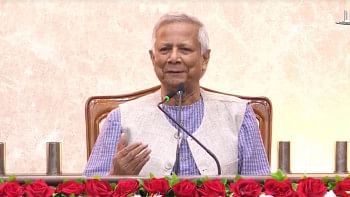Information Commission formed
The Right to Information (RTI) Act went into full effect yesterday with the formation of the three-member Information Commission by President Zillur Rahman.
Retired secretary M Azizur Rahman was appointed the chief information commissioner (CIC), while former secretary Mohammad Abu Taher, and Prof Sadeka Halim of the sociology department at Dhaka University were appointed as the other two commissioners.
A selection committee headed by a Supreme Court judge earlier nominated a panel of six persons for the posts.
Now every citizen has the right to have access to information regarding any government and non-government organisation, with the exception of a few national security and intelligence agencies.
The authorities of any organisation or institution that undertakes public functions are obliged to release information to citizens on demand, according to the provisions of the act.
It however will require some more time for the people's right to information to be fully ensured, as no office of the Information Commission has yet been set up, while an information delivery system is also yet to be set up in government offices. The commission will form a set of rules for effective enforcement of the act.
Deputy Secretary to the Information Ministry Abul Hossain, who is dealing with the act, told The Daily Star yesterday that a process of recruiting manpower for the commission is currently underway. He said the government will also soon disburse funds for the commission.
The Right to Information Ordinance 2008 was promulgated by the immediate past caretaker government, which was later ratified by the new parliament on March 29 this year. The president signed it into a law on April 5, and a gazette notification to that effect was published on April 6.
All provisions of the act will be retroactive since October 20, 2008 except only three regarding demanding information, adjudication of appeals against refusal to provide information, and regarding lodging of complaints with the commission against such denials.
The act however restricts public access to information of at least 20 categories, while it also clearly mentions that organisations related to intelligence and national security are obliged to release information regarding corruption and violation of human rights.
Information seekers must apply in writing on prescribed forms or by e-mail to designated officers by paying a reasonable fee, which will be fixed by the commission.
Officers concerned must release requested information within 20 working days of application submissions.
Officers must let the information seekers know within 10 days of application submissions, if they are unable to release any requested information.
"In case of information involving more than one delivery unit or authority, officers may exhaust a maximum of 30 days for releasing the information… but the authorities must release the information within 24 hours if it is related to life and death, arrest, and release from jail," the law says.
The agencies kept outside the purview of the act are the National Security Intelligence, Directorate General of Forces Intelligence, defence intelligence units, Criminal Investigation Department, Special Security Force, Intelligence Cell of the National Board of Revenue, Special Branch of the police, and the Intelligence Cell of Rapid Action Battalion.
The head office of the commission, to be located in the capital, will function independently and supervise general activities related to the people's right to information. It will also receive complaints against any authority for refusing to release information.
If any official refuses to provide information, individuals may file appeals with the Information Commission. Officials concerned, if found guilty of denying information, may be fined Tk 50 for each day of delay in releasing requested information, but the total sum of the fine must not exceed Tk 5,000.
The Information Commission will have the authority of a civil court under the Code of Civil Procedures 1908.

 For all latest news, follow The Daily Star's Google News channel.
For all latest news, follow The Daily Star's Google News channel. 



Comments